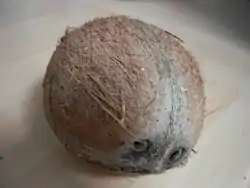coco
English
Etymology
From Spanish/Portuguese coco (“grinning face”) (due to the three holes in the shell resembling a human face).[1]
Pronunciation
- (Received Pronunciation) IPA(key): /ˈkəʊ.kəʊ/
- (US) enPR: kōʹkō, IPA(key): /ˈkoʊ.koʊ/
Audio (US) (file) - Rhymes: -əʊkəʊ
- Homophone: cocoa
Noun
coco (plural cocos)
- Coconut palm.
- Coconut, the fruit of the coconut palm.
- 1625, Samuel Purchas, “Their Cocos and other fruits and food, their Trades and trading, Creatures profitable and hurtfull. Of Male their principall Iland. Their Houſes, Candou, Languages, Apparell.”, in Pvrchas his Pilgrimes. In Five Bookes. [...] The Second Part., volume II, London: Printed by William Stansby for Henrie Fetherstone, and are to be sold at his shop in Pauls Church-yard at the signe of the Rose, OCLC 63012317, page 1643 [sic: 1653]:
- They boyle it alſo, and after dry it and bray it, and of this bran, with egges, hony, milke, and butter of Cocos, they make Florentines, and verie good belly-timber.
-
Catalan
Related terms
Further reading
- “coco” in Diccionari de la llengua catalana, segona edició, Institut d’Estudis Catalans.
French

Pronunciation
- IPA(key): /ko.ko/
- Rhymes: -o
Etymology 1
Italian, from Spanish. The fruit was originally referred to by the Spanish equivalent of croque-mitaine (“bogeyman”), due to the spooky face-like appearance of the three dots at the end of the shell, which developed in coco.
As in English, the fruit was originally referred to as coco (in the 16th century), but in the 17th (as in English) it became usual to refer to it as a nut, in the form noix de coco (“coconut”).
Noun
coco m (plural cocos)
- Fruit of the coconut palm, also called noix de coco
- A kind of bean.
- (slang) Motor fuel.
- (dated) A type of licorice drink, by analogy with coconut milk.
Synonyms
- (fuel): carburant
Hypernyms
- (bean): haricot
Derived terms
Etymology 2
Duplication of initial co-.
Etymology 3
Perhaps by contraction of cocorico (“cock-a-doodle-do”).
Synonyms
- (egg): œuf
Noun
coco m or f (plural cocos)
- (informal) Friendly, joking term for a friend; pal, mate, buddy.
- Salut, coco !
- G’day mate!
- (informal, derogatory) Aggressive, disdainful term of address, usually preceded by mon, ma, or mes. Roughly punk or buddy, as in “You wanna try, punk?”, or “Hey buddy, what do you think you’re doing?”
- Toi, mon coco, tu vas passer un sale quart d’heure !
- You, buddy, are going to have a miserable quarter hour!
- Vous ne perdez rien pour attendre, mes cocos !
- You’re not losing anything by waiting, punks!
Further reading
- “coco” in le Trésor de la langue française informatisé (The Digitized Treasury of the French Language).
Galician
Etymology
From Latin coccum (“berry; gall; insect; scarlet dye”), from Ancient Greek κόκκος (kókkos, “grain, seed, berry”).[1]
Pronunciation
- IPA(key): /ˈkɔko̝/, /ˈkoko̝/
Derived terms
- coco de luz (“glowworm”)
References
- “coco” in Dicionario de Dicionarios da lingua galega, SLI - ILGA 2006-2013.
- “coco” in Tesouro informatizado da lingua galega. Santiago: ILG.
- “coco” in Álvarez, Rosario (coord.): Tesouro do léxico patrimonial galego e portugués, Santiago de Compostela: Instituto da Lingua Galega.
- Rivas Quintas, Eligio (2015). Dicionario etimolóxico da lingua galega. Santiago de Compostela: Tórculo. →ISBN, s.v. coco.
Latin
Pronunciation
- (Classical) IPA(key): /ˈko.koː/, [ˈkɔ.koː]
Verb
cocō (present infinitive cocere, perfect active coxī, supine coctum); third conjugation
- Alternative form of coquō
Inflection
References
- coco in Charlton T. Lewis and Charles Short (1879) A Latin Dictionary, Oxford: Clarendon Press
- coco in Charles du Fresne du Cange’s Glossarium Mediæ et Infimæ Latinitatis (augmented edition, 1883–1887)
Norman
Etymology
Compare French coco.
Spanish
Pronunciation
- IPA(key): /ˈkoko/
Etymology 1
From coco.
Derived terms
- agua de coco
- cocotero
- cocotal
- mal de coco
Etymology 2
From Portuguese côco (“bogeyman, grinning face”).
Noun
coco m (plural cocos)
- (entomology) weevil
- Synonym: gorgojo
- (bacteriology) coccus
- Synonym: micrococo
Further reading
- “coco” in Diccionario de la lengua española, Vigésima tercera edición, Real Academia Española, 2014.
